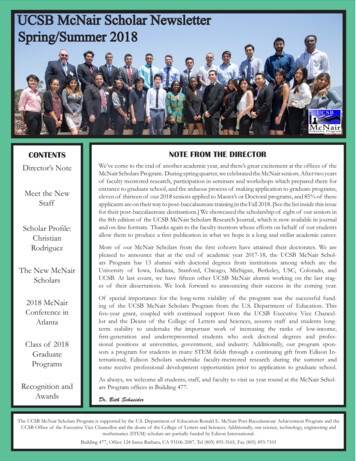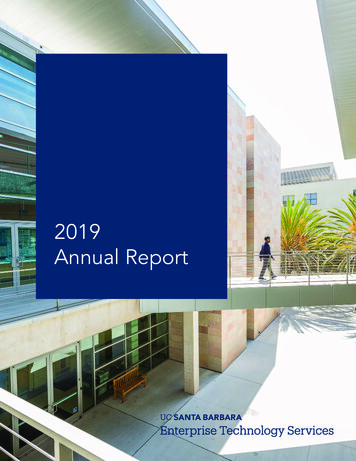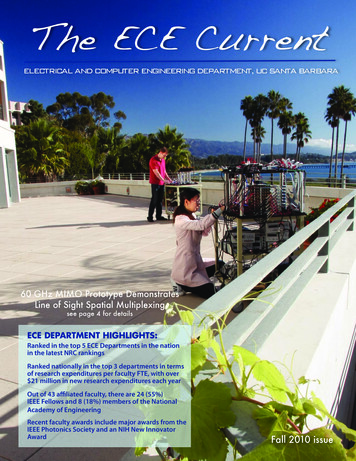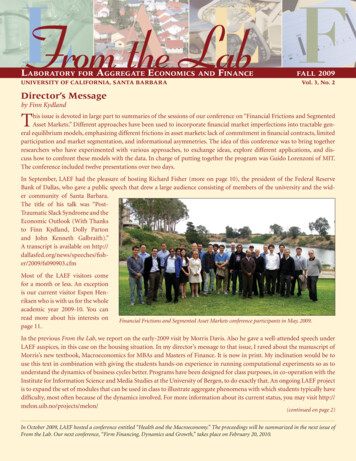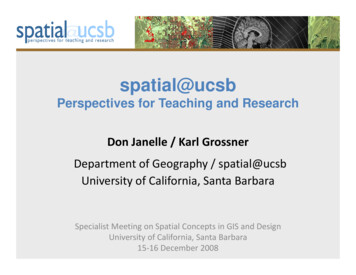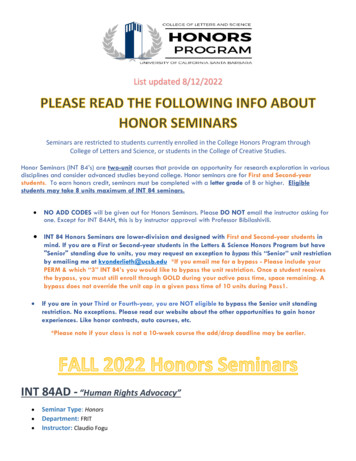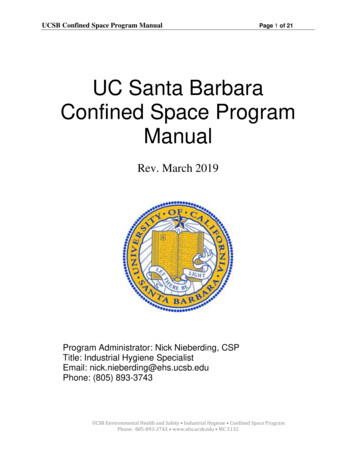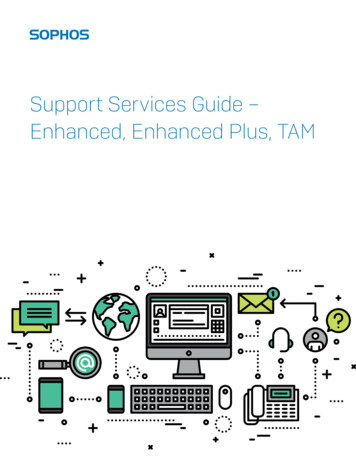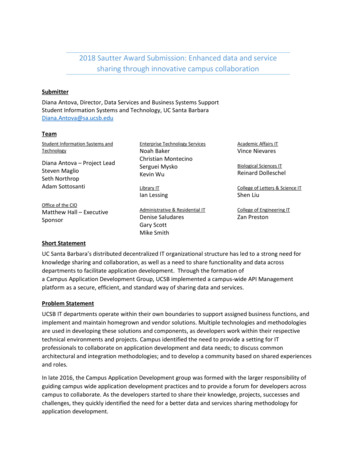
Transcription
2018 Sautter Award Submission: Enhanced data and servicesharing through innovative campus collaborationSubmitterDiana Antova, Director, Data Services and Business Systems SupportStudent Information Systems and Technology, UC Santa BarbaraDiana.Antova@sa.ucsb.eduTeamStudent Information Systems andTechnologyDiana Antova – Project LeadSteven MaglioSeth NorthropAdam SottosantiOffice of the CIOMatthew Hall – ExecutiveSponsorEnterprise Technology ServicesAcademic Affairs ITNoah BakerChristian MontecinoSerguei MyskoKevin WuVince NievaresLibrary ITCollege of Letters & Science ITIan LessingShen LiuAdministrative & Residential ITCollege of Engineering ITDenise SaludaresGary ScottMike SmithZan PrestonBiological Sciences ITReinard DolleschelShort StatementUC Santa Barbara’s distributed decentralized IT organizational structure has led to a strong need forknowledge sharing and collaboration, as well as a need to share functionality and data acrossdepartments to facilitate application development. Through the formation ofa Campus Application Development Group, UCSB implemented a campus-wide API Managementplatform as a secure, efficient, and standard way of sharing data and services.Problem StatementUCSB IT departments operate within their own boundaries to support assigned business functions, andimplement and maintain homegrown and vendor solutions. Multiple technologies and methodologiesare used in developing these solutions and components, as developers work within their respectivetechnical environments and projects. Campus identified the need to provide a setting for ITprofessionals to collaborate on application development and data needs; to discuss commonarchitectural and integration methodologies; and to develop a community based on shared experiencesand roles.In late 2016, the Campus Application Development group was formed with the larger responsibility ofguiding campus wide application development practices and to provide a forum for developers acrosscampus to collaborate. As the developers started to share their knowledge, projects, successes andchallenges, they quickly identified the need for a better data and services sharing methodology forapplication development.
Through the years, our IT staff have come up with a variety of ways to provide the data necessary fordepartments to function successfully and to supplement the functionality provided by the StudentInformation System, Financial, Payroll, and other systems. This has left a landscape where data flowsthrough automated or manual file extracts, direct database access, one-off web services, or in somecases even the dreaded copy/paste-by-hand processes. Due to the nature of each integration being aone-off solution negotiated to address a particular business need, there has been no standardization.Each new data sharing need led to an ad-hoc solution, which may or may not have been documented.There was also no centralized listing of these solutions. Without a standardized and centralizedintegration technology, anyone who later needed to figure out what and how data flowed betweendepartments had to embark on a time-consuming and exhausting process of interviewing stakeholdersand gathering scattered documentation. This also meant there was no standard practice in governanceof these integrations. Without a standard process for tracking, approving, and managing access to datafeeds, there was no way to readily audit the who/where/when of data sharing.SolutionUnlike previous projects on campus, we took a new approach. The newly formed cross-sectional team ofcampus application developers was charged with tackling the problems described above. This shift inapproach garnered a wider breadth of knowledge and “in the trenches” experiences to bear whenanalyzing the problem.This multi-disciplinary group looked at their usage of web services as a principle, which solved many ofthe difficulties within the problem space. Their analysis led to the selection of a full-featured APIManagement Platform as the central tool around which a comprehensive solution could be developed.The group evaluated multiple API Management tools over a series of months before finally selectingApigee.The team identified the following goals for the new solution: Provide real time integrations between campus systems Provide a platform for standardized data and services sharing Standardize on common data understanding and usage across campus Enhance the data security through better data management and governance processes Eliminate the need to store data in shadow systems on campus Save development time by reducing one-off solutions for data integrations Implement a cloud-based solution to eliminate the need for systems administrator support,hardware and server infrastructureThe nature of this project required a more creative approach in collaboration methodologies, softwareand project management tools. During the implementation, we established issue tracking and coderepositories for the team, provided by one of the IT organizations on campus. We established regularweekly working meetings in a neutral location at the UCSB Library that allowed the implementationteam members to focus on this project and collaboratively work through the implementation. Different
areas of the tool required different skills and the developers were able to focus on their areas ofexpertise while supplementing each-others' skills to make this effort possible. Together we definedcommon API development and publishing standards, with a goal to be transparent to the user where thedata is coming from. The API organization established is system agnostic and focuses on the campusentities and not on organizational boundaries.The distributed team nature of this solution requires a higher level of governance with a structuredapproval process to ensure that data and services are secure and well-managed. The team is developingworkflows to manage these processes and to establish the API management and governance structure.https://developer.ucsb.edu/The new API Management solution achieved by this project is a significant innovation for UCSB. Thegoals of the solution are: Providing a one-stop data and services listing for cross departmental data and services. Unifying the data understanding across campus, with everyone using the same source anddefinitions. Minimizing or eliminating the need for “one-off” solutions. Reducing the effort required to build applications that rely on data from diverse campus widesources and allow developers to focus on delivering business value. Controlling access and rate limitations, allowing us to safely provide access to a diverse set ofapplications. Even student developed applications can be granted access to non-identifyinginstitutional data for projects and research, while not affecting the load on the critical back-endsystems.
In its first stage, we have made available a subset of course, student, employee, and housing data forapplication development. As the system matures and gains traction, we will be expanding the APIcatalog and extending the platform use for data analytics and other API-based services.CollaborationThis project was conducted in collaboration between the following UCSB IT departments: EnterpriseTechnology Services, Student Information Systems and Technology, Library IT, Academic Affairs IT,Administrative and Residential IT, Biological Sciences IT, College of Letters and Sciences IT, and Collegeof Engineering IT. The innovative type of collaboration in this project was a key to its success. Each ITdepartment freely donated their staffs’ time to serve on the implementation team.Robust API management platforms can be very expensive. By collaborating on campus level, we wereable to achieve efficiency in addition to providing standardization and technical knowledge sharingbetween developers.Customer ImpactThrough this initiative, customers will have better access to timely data for their business solutions,which will allow them to better serve researchers, faculty, staff, and students and gain efficiencies inperforming campus functions. In many cases, due to the manual nature of current processes, the datarefreshes happen infrequently, even a few times a quarter, which can be an impediment for timelydecision making. In addition, this solution will help us to self-document campus data use and improvethe governance around it. The reusability of the APIs will provide efficiencies for developers, minimizingthe need for one-off data integration solutions for different systems on campus.Deployment Timeline Fall 2016 – formed the Campus Application Development Group January – June 2017 – API Management tool selection July – October 2017 – Contract signed with Google for Apigee November 2017 – April 2018 – Tool implementation April 2018 – API Management Tool and initial set of APIs released in production May 2018 and forward – Governance and additional APIsTechnologyUCSB implemented Google’s Apigee Edge product for an API Management Platform. It is a cloudsolution, comprised of an API gateway, an admin portal, and a developer portal.The API admin portal has capabilities for API development and publishing, monitoring, rate limiting,usage statistics, and user management. https://apigee.com/edgeThe developer portal is Drupal-based, and is used for API discovery, account registration, applicationaccount creation, API access requests, and testing. The developer portal is flexible and can be extendedto meet our specific needs. https://developer.ucsb.edu/
Measuring Project SuccessReleased only recently, the API system is already starting to see interest in the campus community. Itspotential to improve the system integration infrastructure on campus is significant and the ultimatesuccess will be measured in several years. With that in mind, we are judging success by: The selection of Apigee as the UCSB API Management platform and the successful release of thetool in production The release of our first APIs, the development of new APIs, and the process of transitioningdepartmental APIs and their customers to the platform IT professionals planning new system integrations to utilize the new platform The effort to improve data governance and provide development efficiencies
2018 Sautter Award Submission: Enhanced data and service sharing through innovative campus collaboration Submitter Diana Antova, Director, Data Services and Business Systems Support Student Information Systems and Technology, UC Santa Barbara Diana.Antova@sa.ucsb.edu Team Student Information Systems and Technology Noah
